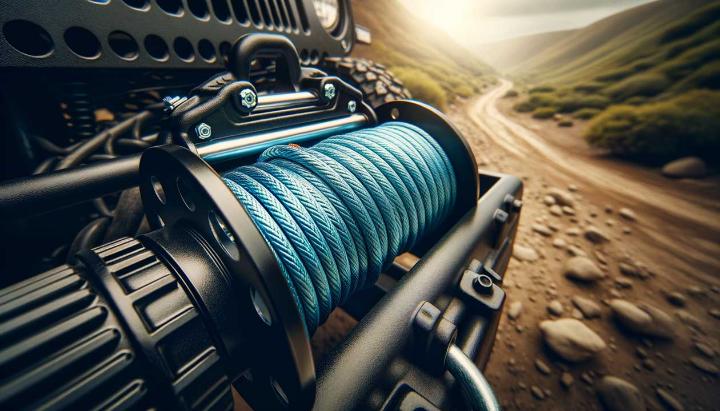Are you tired of wrestling with heavy, cumbersome wire rope winches that seem to have a mind of their own? If you've ever found yourself questioning the safety and convenience of traditional manual wire rope winches, you're not alone. But what if there was a better way?
Enter the game-changing world of synthetic winch ropes. These innovative alternatives are revolutionising the industry, offering a perfect blend of strength, safety, and ease of use. At iRopes, we've crafted a synthetic winch rope that's not just a replacement – it's an upgrade in every sense of the word.
In this post, we'll explore why making the switch to a synthetic wire rope winch manual is more than just a trend – it's a smart move for anyone serious about efficiency and safety in their operations. From the drawbacks of traditional wire ropes to the remarkable benefits of our synthetic alternatives, we'll cover everything you need to know to make an informed decision.
Ready to discover how a lightweight, user-friendly, and ultra-safe synthetic winch rope can transform your work? Let's dive in and unravel the future of winching technology.
Drawbacks of Traditional Wire Rope Winch Manual Operation
As someone who's spent years working with various types of winches, I can tell you that traditional wire rope winch manuals come with their fair share of challenges. Let's dive into the nitty-gritty of why these old-school workhorses might be holding you back.
Common Problems with Wire Rope Winches
Have you ever found yourself wrestling with a wire rope winch, feeling like you're in a tug-of-war with a stubborn mule? You're not alone. Here are some of the most common headaches:
- Heavy and cumbersome to handle: Wire ropes are notoriously weighty, making manual operation a real back-breaker. I remember once nearly throwing my back out trying to manoeuvre a particularly hefty wire rope – not an experience I'd care to repeat!
- Potential safety risks: The sheer weight of wire ropes can lead to accidents if not handled properly. Sharp wire splinters are another hazard that can cause nasty injuries.
- Prone to corrosion and wear: Without proper maintenance, wire ropes can quickly become rusty and frayed, compromising their strength and reliability.
Did you know? Improper lubrication is the leading cause of wire rope failure. Regular maintenance is crucial but can be time-consuming and messy.
Limitations of Manual Inspection for Wire Ropes
Keeping your wire rope winch in top shape isn't just about elbow grease – it's also about keen observation. But here's the rub: visual inspections can only tell you so much.
I once thought my wire rope was in perfect condition based on a quick once-over. Imagine my surprise when it failed during a critical operation! The internal damage wasn't visible to the naked eye, highlighting a major drawback of manual inspections.
Professional inspections using advanced techniques like magnetic flux testing can reveal hidden issues, but they're costly and time-consuming. This leaves many operators in a constant state of uncertainty about their equipment's true condition.
Given these challenges, it's no wonder that many are looking for alternatives. Have you considered how a switch to synthetic winch ropes could address these issues and potentially revolutionise your operations?
Advantages of Switching to a Synthetic Rope Winch
If you've ever struggled with a traditional wire rope winch, you're in for a treat. Synthetic rope winches are revolutionising the off-road and recovery world, offering a host of benefits that make you wonder why we didn't switch sooner. Let's dive into why these modern marvels are quickly becoming the go-to choice for savvy winch operators.
Comparing Synthetic Rope vs Steel Cable
The first thing you'll notice when handling a synthetic winch rope is its incredible lightness. I remember the first time I picked one up - it felt like I was holding air compared to the hefty steel cables I was used to. But don't let that fool you; these ropes are tough as nails.
- Weight difference: Synthetic rope weighs about 1/7th of steel cable, making it a breeze to handle and transport.
- Strength-to-weight ratio: Despite being lighter, synthetic ropes often boast higher breaking strengths than their steel counterparts.
- Safety boost: No more worrying about cable snapback. If a synthetic rope breaks, it falls to the ground instead of whipping back dangerously.
- Performance in various conditions: Synthetic ropes maintain flexibility in cold weather and don't rust or corrode like steel cables.

Key Benefits of Synthetic Winch Rope
Switching to a synthetic winch rope isn't just about the weight savings - it's about transforming your entire winching experience. Here's why I'm never going back to steel:
- Easier handling and storage: The lightweight nature means less strain on your back and easier spooling. You can even coil it up and toss it in your gear bag!
- Improved winch performance: With less weight on the drum, your winch motor doesn't have to work as hard, potentially extending its life.
- Increased operator safety: No more gloves full of steel splinters or worrying about recoil injuries. Synthetic rope is soft to the touch and safer to handle.
- UV and heat considerations: While synthetic ropes can be sensitive to UV rays and extreme heat, proper care and occasional replacement (which is easier and often cheaper than with steel) mitigate these concerns.
Have you ever found yourself in a sticky situation where every ounce of weight matters? That's where synthetic rope really shines. Its lightweight nature means you can carry longer lengths without adding significant weight to your vehicle.
Pro tip: To maximise the lifespan of your synthetic winch rope, rinse it with fresh water after use in muddy or sandy conditions, and let it air dry before respooling.
Making the switch to a synthetic winch rope isn't just an upgrade - it's a game-changer for your off-road adventures. With improved safety, easier handling, and impressive strength, you'll wonder how you ever managed without it. Ready to experience the synthetic advantage for yourself?
Benefits of iRopes' Synthetic Winch Rope
As an off-road enthusiast who's experienced the frustrations of traditional steel cables, I can confidently say that iRopes' synthetic winch rope is a game-changer. Let's explore why this innovative product is rapidly becoming the top choice for vehicle recovery and off-road adventures.
Lightweight and Strong: Advantages Over Steel Cable
When I first held an iRopes synthetic winch rope, I was astounded by its feather-light feel. It's hard to believe something so light could be so strong, but that's exactly what makes it revolutionary.
- Incredible weight reduction: iRopes' synthetic rope is up to 80% lighter than steel cable, making it a breeze to handle even in challenging terrain.
- Superior strength-to-weight ratio: Despite its lightweight nature, this rope boasts a higher breaking strength than traditional steel cables.
- Improved vehicle performance: The reduced weight on your winch drum means less strain on your vehicle's suspension and improved fuel efficiency.

Safety and Ease of Use: Why Choose Synthetic Rope
Safety is paramount in off-road recovery situations, and this is where iRopes' synthetic winch rope truly shines. I've seen firsthand how it can transform a potentially dangerous winching operation into a smooth, worry-free process.
- Enhanced safety features: No more fears of cable snapback. If an iRopes synthetic rope breaks under tension, it simply falls to the ground instead of whipping back dangerously.
- User-friendly handling: The soft, flexible nature of the rope means no more gloves full of steel splinters. It's a joy to work with, even in wet or cold conditions.
- Simplified maintenance: Unlike steel cables that require regular greasing, iRopes' synthetic rope needs only a quick rinse with fresh water after use in muddy conditions.
But don't just take my word for it. John, a seasoned off-road tour guide, shared his experience: "Switching to iRopes' synthetic winch rope has been a revelation. It's made our recovery operations safer and more efficient. We can now carry longer lengths without adding significant weight to our vehicles."
Did you know? iRopes' synthetic winch rope floats on water, making it invaluable for marine recovery applications.
Are you ready to experience the iRopes difference for yourself? Whether you're a weekend warrior or a professional recovery operator, this synthetic winch rope is designed to elevate your off-road experience. Say goodbye to the hassles of steel cable and embrace the future of vehicle recovery with iRopes. For more in-depth comparisons, check out our article on why iRopes synthetic winch rope beats 1 inch steel cable.
If you're tired of dealing with the downsides of a traditional manual wire rope winch, it's time to consider upgrading to a synthetic alternative. Traditional wire rope winch manuals are heavy, difficult to handle, and pose significant safety risks, including sharp splinters and potential failures due to hidden internal damage. In contrast, synthetic ropes are lightweight, easy to manoeuvre, and inherently safer. Moreover, iRopes offers a synthetic winch rope that not only perfectly replaces a manual wire rope winch but is also durable, customisable, and designed for superior performance in various conditions. Embrace the benefits of switching to synthetic, including easier handling, improved safety, and simplified maintenance, and revolutionise your operations with iRopes' cutting-edge solutions.
Unlock the Benefits of Synthetic Winch Ropes Today
Ready to upgrade your winch to a safer, lighter, and more efficient solution? Fill in the form above to get in touch with our experts and discover how iRopes' synthetic winch ropes can transform your operations.